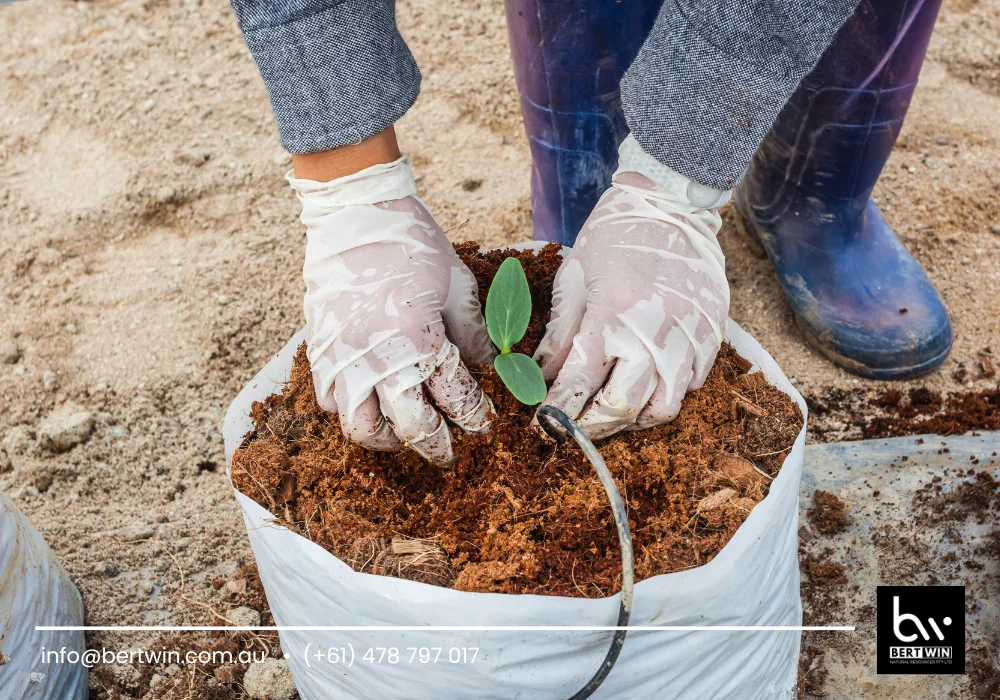Introduction
Coco peat brick has become widely recognized as a sustainable and efficient growing medium, particularly as global agriculture shifts toward environmentally responsible practices. In recent years, industries ranging from horticulture to commercial farming have looked for cleaner alternatives to traditional soil, rockwool, and peat moss. This shift has emerged due to rising concerns regarding environmental degradation, soil depletion, and the increasing need for renewable resources. The use of coco peat brick addresses many of these challenges because it utilizes coconut husk fibers—an agricultural by-product that would otherwise go to waste.

What Is a Coco Peat Brick?
A coco peat brick is a compressed block of coir pith, formed from the spongy interior of the coconut husk. When hydrated, it expands several times its original size, transforming into a loose and aerated medium suitable for various planting needs. Because it contains natural lignin, the material decomposes slowly, providing long-term structural support for plant roots.
This product is highly valued for its water retention capacity, typically absorbing up to eight times its weight in moisture. This feature makes coco peat brick ideal for regions with irregular rainfall, greenhouse farming systems, and growers looking to optimize irrigation efficiency.
Advantages of Using Coco Pith Brick
High Water-Holding Capacity
One of the greatest benefits of using coco peat brick is its ability to retain water without causing waterlogging. This balanced moisture environment helps seedlings establish strong roots, supports nutrient absorption, and reduces the frequency of irrigation.
Excellent Aeration
The fibrous structure of a coco peat brick creates pockets of air within the growing medium, encouraging healthy root development. Proper aeration is essential for oxygen exchange, and plants grown in coco peat usually show enhanced vigor and improved resistance to diseases.
Eco-Friendly and Sustainable
Coco peat brick is derived from coconut husks, a renewable resource that does not require cutting down trees or extracting peat from fragile bogs. It is biodegradable, non-toxic, and helps reduce waste in coconut-producing regions.
Free From Pathogens
Because the bricks undergo heat treatment or sterilization processes, the final product is generally free from harmful pests, fungi, and weed seeds. This makes it especially suitable for nursery operations and commercial growers who need consistent quality.
Lightweight and Easy to Transport
Compared to bulky soil or traditional potting mixes, coco peat brick is compact and lightweight. A single brick expands significantly upon hydration, allowing growers to store and handle large volumes easily.
Applications of Coco Brick
Horticulture and Gardening
Whether for home gardens, nurseries, or professional landscaping, coco peat brick serves as an effective base material for potting mixes. Gardeners often combine it with compost, perlite, or vermiculite to create custom blends that enhance plant growth.
Hydroponic Systems
Hydroponic growers appreciate coco peat brick for its sterile nature and structural stability. It supports nutrient delivery in water-based growing systems and maintains moisture consistency around the roots.
Seedling and Nursery Production
Because of its fine texture and neutral pH, coco peat brick provides an ideal medium for germinating seeds. Nurseries rely on it to promote uniform growth and increase seedling survival rates.
Mushroom Cultivation
Coco peat brick is also used as a substrate in mushroom farming due to its ability to hold moisture while providing a clean and controlled environment.
Key Considerations When Using Coco Brick
Proper Hydration
Before use, a coco peat brick must be soaked in water until fully expanded. The quality of water, soaking time, and complete rehydration are key steps for achieving optimal texture.
EC and pH Level
Although generally neutral, some coco peat products may contain residual salts. Rinsing and buffering may be necessary depending on the intended crop. Growers should check the electrical conductivity (EC) and pH level before mixing it with other materials.
Blending With Nutrients
Since coco peat brick is inert, it does not naturally contain significant nutrients. Therefore, adding fertilizers or organic amendments is essential to ensure healthy plant growth.
Why Coco Peat Brick Is a Preferred Choice for Modern Agriculture
The expanding global demand for sustainable farming solutions has further strengthened the position of coco peat brick in agricultural industries. Its renewable origin, combined with practical advantages such as moisture retention and aeration, make it an ideal option for growers seeking efficiency and eco-friendly materials.
Moreover, its role in reducing agricultural waste cannot be underestimated. Millions of coconut husks are produced annually, and utilizing them for coco peat brick manufacturing helps minimize landfill waste while supporting circular economy practices.
Choosing Quality Coco Brick
When selecting coco peat brick for large or small-scale use, growers should prioritize reputable manufacturers. High-quality bricks typically have low salt content, uniform compression, and consistent expansion volume. Certifications and laboratory test reports can provide assurance of product safety and reliability.
Storage and Shelf Life
Proper storage is essential to maintain product quality. Bricks should be kept in dry, shaded areas to prevent contamination or moisture absorption before use. When stored correctly, coco peat brick can last for several years.
Conclusion
Coco peat brick has become a vital component in modern agriculture and horticulture due to its eco-friendly nature, excellent water retention, and versatile applications. As sustainable growing practices continue to evolve, the importance of renewable and high-performing materials will only grow. By adopting coco peat brick, farmers, gardeners, and commercial producers can contribute to a more sustainable agricultural future while improving productivity and plant health.
For further information, you may contact WhatsApp at (+61) 478797017 or via email at info@bertwin.com.au.
Read more:
